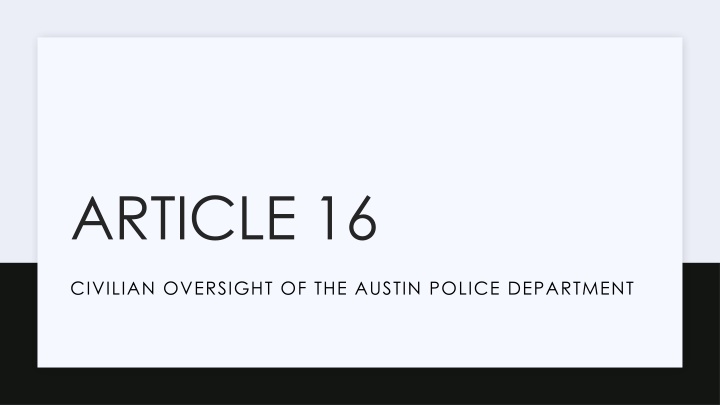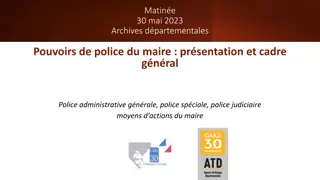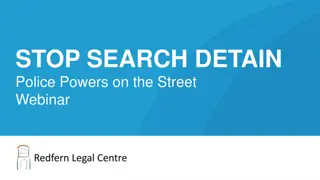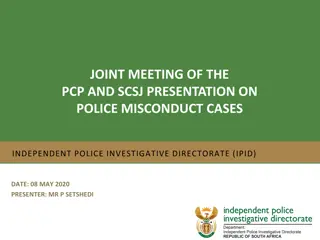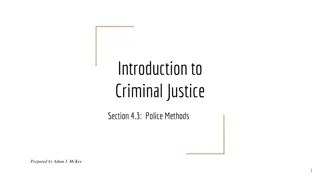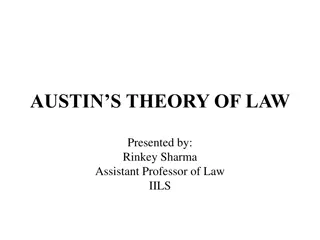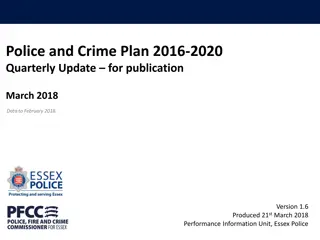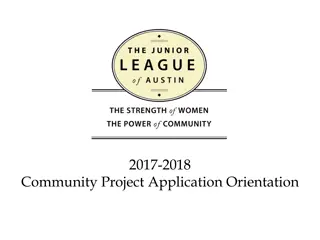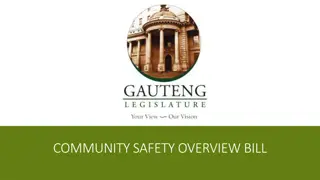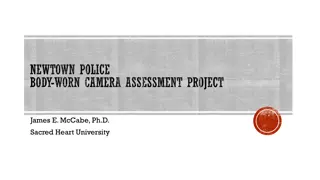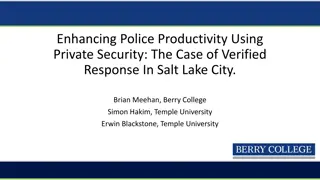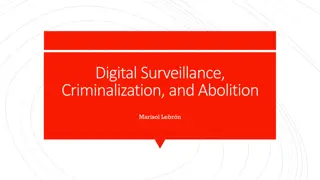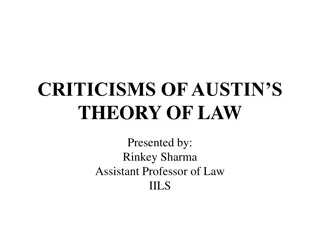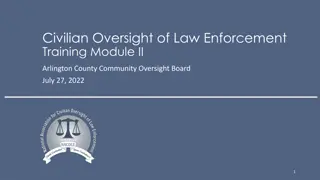Enhancing Civilian Oversight of Austin Police Department
The civilian oversight of the Austin Police Department is detailed, highlighting the responsibilities of the Office of Police Oversight and the Community Police Review Commission. A renewed Article 16 proposal aims to improve transparency, accountability, and community relations. The mission of the OPO is to ensure impartial oversight, accountability, transparency, and community partnerships. Key goals include defining authority, fostering collaboration, promoting procedural justice, and maintaining legitimacy for the oversight entities.
Download Presentation

Please find below an Image/Link to download the presentation.
The content on the website is provided AS IS for your information and personal use only. It may not be sold, licensed, or shared on other websites without obtaining consent from the author.If you encounter any issues during the download, it is possible that the publisher has removed the file from their server.
You are allowed to download the files provided on this website for personal or commercial use, subject to the condition that they are used lawfully. All files are the property of their respective owners.
The content on the website is provided AS IS for your information and personal use only. It may not be sold, licensed, or shared on other websites without obtaining consent from the author.
E N D
Presentation Transcript
ARTICLE 16 CIVILIAN OVERSIGHT OF THE AUSTIN POLICE DEPARTMENT
POLICE OVERSIGHT IN AUSTIN TODAY Office of Police Oversight Staff of 20+ professionals employed by the City of Austin Responsibilities: Provide a safe and accessible process for the reporting of alleged police misconduct Initiate complaints independent of specific concerns from the community Make recommendations to City Manager and APD about individual incidents and investigations Make recommendations on policy and procedure of APD Community Police Review Commission 10 unpaid volunteers appointed by City Manager Responsibilities: Make policy-level recommendations regarding discipline, training, community relations, and complaint process Address community concerns Review patterns and practices of APD Assess critical incidents and review individual cases of police misconduct Make fair and objective recommendations based solely on facts and evidence Assess effectiveness of OPO
RESPONSE TO CITYS PROPOSAL FOR ARTICLE 16 Today, we are proud and excited to present a renewed and revitalized Article 16 that capitalizes on the spirit of transparency and accountability the community deserves from both the police and those whom oversee the police.
MISSION OF OFFICE OF POLICE OVERSIGHT The mission of the Office of Police Oversight (OPO) is to provide impartial oversight of the Austin Police Department s conduct, practices, and policies to enhance accountability, inform the public to increase transparency, and create sustainable partnerships throughout the community. Source: https://alpha.austin.gov/en/police-oversight/
GOALS FOR ARTICLE 16 Clearly define the jurisdiction and authority of the Office of Police Oversight (OPO) Establish and encourage collaborative and positive relationship between department and OPO Prioritize procedural justice for both citizens and officers Promote legitimacy of OPO within the department by ensuring trustworthy and unbiased motives with a genuine interest in community concerns and efficacy of law enforcement Maintain Community Police Review Commission
WHY OVERSIGHT SHOULD BE INCLUDED IN CONTRACT Ensures transparency in all facets of the investigations into allegations of police misconduct Access to confidential personnel files Promotes legitimacy and ensures authority of the oversight bodies Provides framework for collaboration between APD and OPO Continues the tradition of innovative and robust civilian oversight for the City of Austin
KROLL REPORT ISSUED MAY 31, 2022 The Kroll report notes: Improvements can always be made, and we hope that this review has helped focus on a few areas where APD s internal affairs function and administrative process can be so improved. All, but one, of the recommendations made by Kroll are dictated by APD policy and procedures, not the Meet and Confer Agreement.
KROLL GUIDING PRINCIPLES ARTICLE 16 KROLL GUIDING PRINCIPLES ARTICLE 16 Section 1. b) The purpose of Civilian Oversight is: 1. To assure timely, fair, impartial, and objective administrative review of complaints against police officers, while protecting the individual rights of officers and civilians; Implementing a fair and objective fact-finding process that respects the rights off all individuals including the person complaint and the officer accused of wrongdoing, is the most essential role of the internal affairs function. involved, making the
KROLL GUIDING PRINCIPLES ARTICLE 16 KROLL GUIDING PRINCIPLES ARTICLE 16 Section 2. Definitions b) and c) allows anonymous complainants and all complaints to be received without the requirement to verify the complaint in writing before a public officer who is authorized by law to take statements under oath. Kroll recommends that agencies should take in all complaints with restriction .
Kroll Guiding Principles / Article 16 Kroll Guiding Principles Voluntary mediation conducted by a neutral facilitator, in lieu of investigation and adjudication, can help resolve minor complaints that are not easily resolved through traditional investigation. Article 16 Section 13. The OPO shall initiate a mediation program within the office wherein complainants may meet the officer that is the subject of the complaint with a certified mediator to see if a resolution to the complaint may be reached.
CIVILIAN OVERSIGHT IN MAJOR TEXAS CITIES AUSTIN CONTINUES TO REMAIN ON THE FOREFRONT OF MODERN DAY POLICE REFORM AND CIVILIAN OVERSIGHT. THE OFFICE OF POLICE OVERSIGHT IS STAFFED WITH OVER 20 FULL TIME EMPLOYEES TO ENSURE POLICE MISCONDUCT IS INVESTIGATED FAIRLY AND THOROUGHLY. THE OPO HAS A SUBSTANTIAL BUDGET AND RESOURCES IN CONTRAST TO THEIR COUNTERPARTS IN OTHER MAJOR TEXAS CITIES.
CIVILIAN OVERSIGHT SAN ANTONIO POLICE DEPARTMENT Complaint and Administrative Review Board Board Personnel Seven (7) civilians (volunteers) Seven (7) sworn members of SAPD Process and Authority Regular meetings wherein IAD investigator presents detailed findings regarding the cases on the agenda If the complainant, witness(es), or subject officer wishes to attend, the board may questions those persons Board will cast secret ballots as to whether complaint should be sustained; if the majority votes to sustain the board will cast a second vote regarding discipline NON-BINDING RECOMMENDATIONS; CHIEF MAINTAINS FINAL DECISION-MAKING AUTHORITY ON ALL ASPECTS OF CONDUCT UNDER INVESTIGATION COMPLAINT INTAKE PROCESS: must contact SAPD Internal Affairs or police supervisor in person, by phone, or email. Complainant required to provide sworn statement to IAD supervisor to formalize complaint and initiate investigation.
CIVILIAN OVERSIGHT EL PASO El Paso Discipline Review Board and Shooting Review Board Still in development; a process that has been ongoing for approximately 2 years Representatives from different city departments are working together to determine best practices for civilian oversight; the team provides updates to Council every 90 days COMPLAINT INTAKE PROCESS: Initial complaint may be made to Internal Affairs or any police supervisor. If initial complaint is made via email or over the phone, the complainant is required to submit a follow up Affidavit, signed and notarized, on the designated form to formalize the complaint and initiate the investigation.
CIVILIAN OVERSIGHT DALLAS POLICE DEPARTMENT Office of Community Police Oversight Staffed with a monitor and administrative support personnel report directly to City Manager Duties of OCPO Provide support to Community Oversight Board Provide reports to city manager Conduct investigations as directed by board Receive EXTERNAL CIVILIAN complaints Make recommendations regarding these complaints (mediation, IAD investigation etc) Monitor IAD investigations of EXTERNAL complaints Provide updates at conclusion of external and administrative investigations COMPLAINT INTAKE PROCESS: Online form or in person at IAD/substations that requires identifying information and a declaration of accuracy Option to call the OCPO directly or email the civilian complaint form
CIVILIAN OVERSIGHT FT. WORTH Office of the Police Oversight Monitor Operates as a separate department from the police Receives and reviews complaints Forwards complaints to IAD when appropriate Monitors and reviews IAD s investigation Provides non-binding recommendations to FWPD after review of investigation Notifies complainant of outcome COMPLAINT INTAKE PROCESS Can file complaint online, in person, by mail To initiate a FORMAL complaint, the complaint document must be signed and notarized If a complainant does not wish to identify themselves or notarize their complaint, OPOM may conduct an informal review of the complaint
CIVILIAN OVERSIGHT - HOUSTON Hybrid Model Office of Policing Reform and Accountability Professional staff employed by city No formal participation in investigation Independent Police Oversight Board (IPOB) Comprised of volunteers - May review all internal investigations and shall review the following: use of force, discharge of firearms and/or serious bodily injury or death Provides non-binding recommendations on discipline, recruitment, training, and evaluation of police officers Consider community concerns regarding the department COMPLAINT INTAKE PROCESS: must complete Sworn Affidavit detailing misconduct; can be completed in person at various locations, both police and non-police affiliated locations. The sworn statement can also be completed and submitted via mail to the above locations. Community organizers at LULAC and NAACP have been trained to assist individuals in completing the Affidavit and receiving the complaint on behalf of HPD. **Anonymous Complaints: OPRA will receive an anonymous complaint, but will not follow up with any formal investigation. The anonymous complaint may lead to an internal and INFORMAL investigation.**
FINAL THOUGHTS According to Merrick Bobb, the author of an often referenced law review article titled Civilian Oversight of the Police in the United States, the most effective form of civilian oversight is that in which the least restrictive means necessary to achieve police accountability is the best approach to the oversight function in the long-term.
